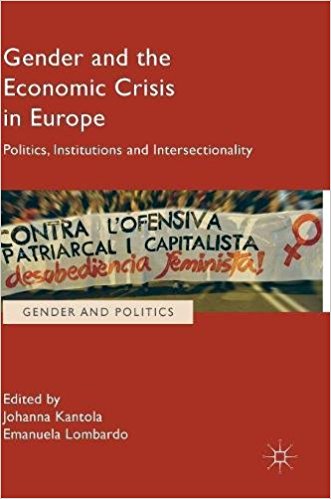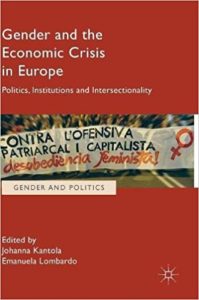
Gender and the Economic Crisis in Europe: Politics, Institutions and Intersectionality edited by Johanna Kantola and Emanuela Lombardo
This is part of our special feature The Gender of Power.

“Against Patriarchal and Capitalist Attacks: Feminist Disobedience!”
This quote appears, in the original Catalan, on the cover of this new edited volume of essays about the economic crisis from a range of feminist political scientists. In a very real sense, the book itself is an act of feminist disobedience. As we approach the ten-year anniversary of the economic crisis, the stories of the crisis seem well established. The small library of books and articles written by economists, political scientists, journalists, politicians, and others has documented all the causes, impacts, villains, and victims of the crisis. This book shows how partial such accounts, however prolific, in fact are. It is a book that shows the gendered nature of the crisis, in particular looking at the gendered nature of the institutional reforms, and the gendered impacts of the austerity response. It generates new questions, proposing that the crisis is defined is itself as an expression of gender power, and highlighting how crisis rhetoric often times serves to continue policies of exclusion.
Feminists have not been silent on the crisis, and feminist economists were quick to document the impacts and responses, especially regarding austerity on women. This work begins from understanding how the economy is already gendered. Since women earn, on average, less than men, and also tend to have less wealth overall, they are impacted differently by tax and spending policies. Additionally, the segmentation of the labour market along gender lines, with women overrepresented in the public sector, in the services sector, and in precarious and part-time work, more generally means that policies that impact employment and on workers rights can also have gendered impacts. There is now a robust literature documenting how the crisis response has had gendered impacts, with work from academics, NGOs, and European institutions all finding similar discriminating results from austerity and the “structural reforms” proposed by the EU and state governments (Bettio 2013; Elomaki 2012; Karamessini and Rubery 2013).
This book is the political science analysis to complement the economic analysis. Rather than focusing on the economic implications of the crisis and the responses, it looks more at the political impacts. This allows it to document the changes in institutions, in norms, and in the power distribution of interests. The book covers a broad range of topics, and is refreshingly pluralist in regards to methodology and approaches. It is broken down into three sections, the first examines the crisis response at the European level, the second offering analysis of particular state’s experiences of the crisis, and the third looking at feminist and intersectional resistance to the crisis responses.
In examining the impact of the crisis at the EU level, the book traces the broader shifts in gender equality policy, highlighting how there have been different understandings of gender equality, and a move towards a more rights based (rather than structure focused) gender equality policy. This is complimented by analysis that highlights the sidelining of gender concerns within the field of economic policy. In her chapter, Rosalind Cavaghan argues that the way that economic knowledge is being constructed at the EU level is serving to exclude feminist input. The country case studies offer a complementary narrative. They each show how, despite the specificities of each country’s experience of the crisis, there has been a similar sidelining of feminist or gender sensitive policy during the response to the crisis. A recurring theme emerges from both the EU analysis and the case studies – that of invisibility. In an analysis of the crisis discourses in Portuguese politics, Ana Prata shows that concerns with gender equality are mostly absent, and argues that the power to construct the narrative of the crisis is a key mechanism in deciding whose concerns are addressed. The book is not satisfied to simply describe women as the subjects of economic policy and politics, however, and the final section explores feminist and intersectional resistance to austerity and other crisis measures. Within this section, the impact of the crisis on the mobilization of feminist activism is explored in both Finland and Spain. In both countries, the initial responses of the left or of established feminist groups were seen as limited, and so more radical movements emerged. The implications of these new groups are still being experienced, but the analysis of these two chapters demonstrate convincingly that any analysis of the political responses to the crisis needs to take account of this feminist mobilizing.
Among the chapters on resistance, one chapter that really stands out is by Akwugo Emejulu and Leah Bassel on the activism of minority women. It highlights how even some feminist work can be myopic, ignoring the racialized nature of austerity policies. It is here that the “intersectionality” of the book’s subtitle really comes into focus. Intersectionality is an approach which seeks to understand the variety of experiences that women have – it is meant as a counterbalance to the historical centering of middle-class, straight, and white women. Provocatively, this chapter asks whether it is even useful to talk of a crisis. The use of the crisis terminology implies a break with previous practice, a sudden and dramatic shift in fortunes. Emejulu and Bassel argue that minority women had been experiencing crisis conditions long before the collapse of the Lehman Brothers bank, or the bailouts of Greece, Portugal, and Ireland. This chapter is rich in insight, with excerpts from interviews with minority women activists from Scotland, England, and France. This chapter is radical – “Insisting on lived experience recuperates and makes minority women visible political actors in a context that asserts their passivity, absence and/or irrelevance” (Emejulu and Bassel 2017, 205).
A strong theme that emerges from the book is that of continuity. In all three sections of the book, different authors point out how much of the crisis response has in fact been a continuation of practices and trends visible before the crisis. At the EU level, feminist knowledge was already being side-lined, in particular from economic policy making. Gender mainstreaming, the mechanism for including gender considerations at every stage of the policy process, was already in retreat before it disappeared entirely in the development of the post-crisis regime. At the member state level, existing dominant ideologies of both neoliberal economic governance and traditionalist values had been pushing for the types of gendered reforms seen since the crisis. As such, the book highlights again that how we tell the stories of a crisis are of paramount importance. Analysis that views the crisis as a decisive moment, where the before and after are dramatically different, lend themselves to gender blind analysis, as they cannot see the “crises” of gender equality and exclusion that existed before the crisis as narrated this way. This view of the crisis as continuation or exacerbation is not unique to feminist analysis. Other work on the ideology of neoliberalism has highlighted how the crisis has actually served to further empower the previously dominant ideas (Crouch 2011; Schmidt and Thatcher 2014). What is striking, however, is that such accounts do not consider the role of gendered ideas in such resilience.
This book is a direct contradiction to the major accounts of the economic crisis that have excluded any consideration of gender. Political science and political economy have often been guilty of such blind spots. However, it is particularly striking when you consider how feminist analysis, such as that of this book, could be usefully applied to answering some of the key questions in the literature on the economic crisis. Feminist political economists have developed deep and nuanced analysis of austerity, as it was applied in development policies around the world. The chapters in this book show how the power dynamics of the crisis can be better understood when gender is considered. Indeed, understanding the gender politics of the crisis may be a key contribution in understanding the legitimacy of the crisis response (O’Dwyer 2017). The chapters in this book reflect just a snapshot of the innovative work being done by feminist scholarship on the EU, and even on the crisis. Even so, taken together, the chapters give a more complete, and more analytically productive, account of the crisis than the gender blind accounts that have dominated discussions until now. The book will be read with interest by feminist scholars of the EU and of politics more broadly. But it would also be a very worthwhile read for anyone seeking to understand the new political and economic dynamics of Europe today.
Reviewed by Muireann O’Dwyer, University College Dublin
Gender and the Economic Crisis in Europe: Politics, Institutions and Intersectionality
Edited by Johanna Kantola and Emanuela Lombardo
Publisher: Palgrave Macmillan
Hardcover / 282 pages / 2017
ISBN: 978-3-319-50777-4
To read more book reviews, please click here.
References:
Bettio, Francesca. 2013. The Impact of the Economic Crisis on the Situation of Women and Men and on Gender Equality Policies: Synthesis Report. Luxembourg: Publications Office of the European Union.
Crouch, Colin. 2011. The Strange Non-Death of Neo-Liberalism. Polity. h
Elomaki, A. 2012. ‘The Price of Austerity: The Impact on Women’s Rights and Gender Equality in Europe’. European Women’s Lobby,
Emejulu, Akwugo, and Leah Bassel. 2017. ‘Whose Crisis Counts? Minority Women, Austerity and Activism in France and Britain’. In Gender and the Economic Crisis in Europe, 185–208. Springer. http://link.springer.com/chapter/10.1007/978-3-319-50778-1_9.
Karamessini, Maria, and Jill Rubery. 2013. Women and Austerity: The Economic Crisis and the Future for Gender Equality. Routledge.
O’Dwyer, Muireann. 2017. ‘Gendering Ideational Political Economy in the European Union’. European Conference on Gender and Politics, Lausanne. https://ecpr.eu/Events/PaperDetails.aspx?PaperID=33521&EventID=114.
Schmidt, Vivien A., and Mark Thatcher. 2014. ‘Why Are Neoliberal Ideas so Resilient in Europe’s Political Economy?’ Critical Policy Studies 8 (3): 340–47.
Published on July 6, 2017.




